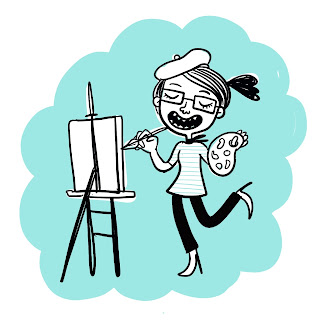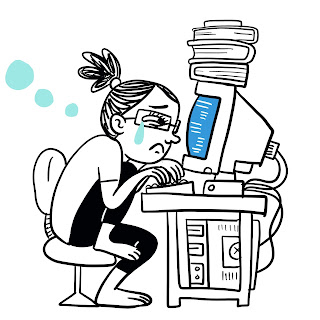Once upon a time....
My freelance journey began in university, as I was taking up Management Information Systems. I had been hoodwinked into this major by a sexy description on the course catalog. It's a trap! Run away!!! I thought I was embarking on a future in multimedia. Instead, what I got was two measly multimedia electives in a degree that was the mutant love child of Computer Science and Management, a product of one wild night sometime in the '90s. Oh well, at least there was a really cushy job with lots of money and expat life prospects at the end of this.
By all accounts, I was doing well: I had friends, extracurricular activities, good grades. Life should have been great except for one thing: I was absolutely miserable.
I knew that if I kept going down the same road as my classmates, I might be bathing in gold nuggets and living in a castle someday, but I would still be miserable. Like a lot of artistic people, I knew deep down, in my heart, guts and kidneys, that I wouldn't be truly satisfied with life unless I was doing something creative.
I needed to get off this path and onto my own. But how?
A portfolio is your key to the creative industry.
I couldn't change my major. I was only in this fancy private school thanks to three scholarships, so shifting was out of the budget and out of the question.
What could I do so that I could have a chance at a slightly creative job even with my non-creative diploma? I asked around, and it seemed that an entry-level job at the creative department of an advertising agency might do the trick. I just needed a portfolio.
For the next two years, I crammed a second major (invisible and uncredited) in Design, thanks to the power of the almighty Library Card (there were no YouTube tutorials in those days) and a nonexistent social life (I didn't date, drink, or party, so I had all the time to sit in front of my computer and fiddle around with Photoshop and whatever else caught my fancy. I was a super nerd so I enjoyed it!)
By the end of my junior year, I had cobbled together a rudimentary portfolio out of my late night experiments and some class projects. Then I met a friend of a friend of a friend who asked me a question that would change the course of my life.
It would help to know what you're doing.
I had ZERO idea how to edit videos. I had previously "directed" some short videos for a few school projects. (Translation: I sat next to a video editor we hired to make sure that the clips showed up in the correct order, and tried to use big words in an attempt sound like I knew what I was doing) Editing didn't seem like it would be THAT hard, right. I had messed around with Flash for a class presentation trying to impress my crush (who, alas, did NOT fall in love with my nerdy superpowers) so I had some idea of how it might work.
But I did jump at the chance to do the project, not just for the promise of moneys (ka-ching! ka-ching!) but more importantly, I thought it would bring me one step closer to my ultimate dream: to make cartoons!!!
No skills? No problem!
Push through with FIGHTING SPIRIT!!!
One week, three library books and gallons of caffeine after I began, the project was done. It was very simple work, just basic cuts and no fancy effects whatsoever -- but the footage I had gotten was just from a home camcorder, so it did the job well enough.
Technically, it hadn't been that difficult. It just took FOOOOREEEEVER. Back then, when dinosaurs roamed the land, videos were captured with tape recorders and you would have to convert the tape footage into digital format, second by painful second, so that you edit the footage on the computer. Because this was a total n00b who had no idea how to do this properly, I had to keep my eyes on the conversion preview screen because I was terrified the program didn’t glitch or something like that. Maybe I should have watched a movie, but you couldn't do that on phones back then.
Other than wasting what felt like days on just the conversion, I actually enjoyed the edit, but only because I love problem solving and the thrill of seeing a job accomplished. But for the actual work itself - not so much. Definitely not enough to imagine many similar jobs for the foreseeable future.
And the talent fee was so small that it might not be worth the time it would take me to do similar projects. It would take me around a year to actually be able to collect the money, and not for the lack of trying.
Oh, well. I chalked all that up to experience. I had finished my first real project, my first paying client. I was “officially” a creative professional!
I knew nothing back then. I had barely any marketable skills, zero business sense and no client management skills either. All I had was a library card, a decent computer, and a ton of fighting spirit. I had a portfolio, so I knew that much at least! But I didn't know about the right way of doing things, or how I could have saved my butt a whole lot of trouble if I had known about Project Proposals or Contracts.
If I could go back in time, I would probably shake my younger self and say, "For the love of all that is good and holy, don't say 'yes' if you don't know what you're doing!" But then again, maybe I wouldn't have gotten here if I didn't say Yes to a lot of opportunities I wasn't ready for.
Often when you’re starting out as a freelancer, you say “YES!” to every project that opens up. Say "YES!" then just close your eyes and pray that you can figure out how to do it as you go along. After the work is done and you haven’t made anything (or anyone) explode, you can either go, “Wow, that was fun! Let’s do more of that,” or “Never again.”
I never edited a video again, but a decade later but I got to work on video projects, but as producer or director. A much better fit for me than video editing!
What you actually need to start freelancing...
If you really want to start taking on freelance projects, you'll need a portfolio, which proves that you can do the work you're trying to get hired for. You'll need hardware and software that can handle the job (preferably legal original stuff!). You will need the necessary skills to operate that hardware and software. And you will need signed paperwork* to seal the deal and save you a mountain of problems later on.
*Contract, Cost Estimate, Statement of Work, Project Proposal -- it's all the same thing, just different names.
*Contract, Cost Estimate, Statement of Work, Project Proposal -- it's all the same thing, just different names.
But the most basic thing you need is a list of services you want to offer. To know what you should put on that list, you need to know which of your skills the world actually needs, wants, and is willing to pay for.









No comments